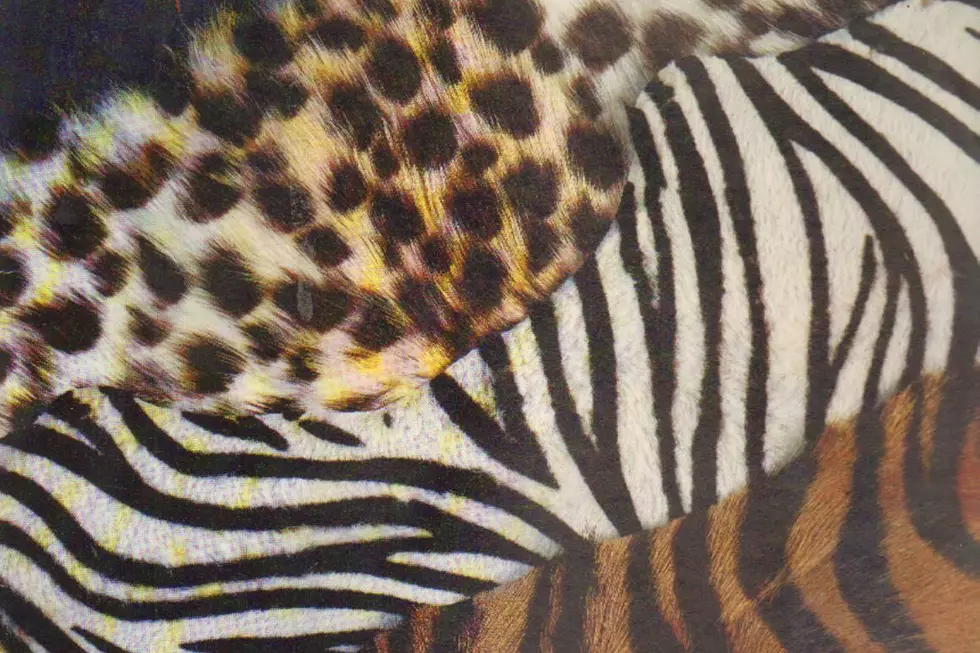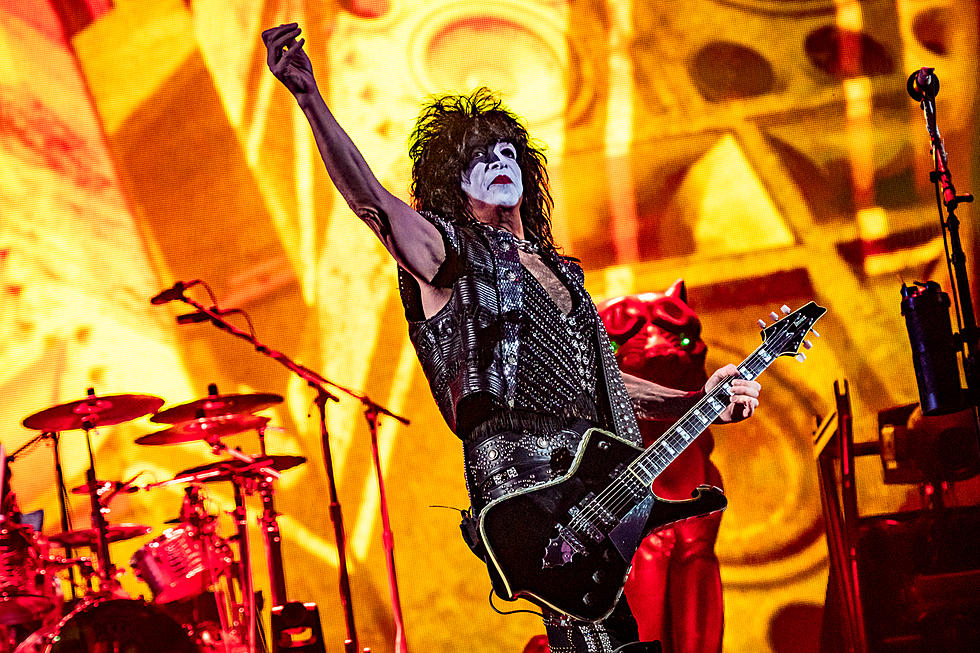
When Paul Stanley Became a One-Man Band on Kiss’ ‘Animalize’
For the first time in several trouble-plagued years, Kiss entered the recording sessions for 1984's Animalize on both a commercial and a critical winning streak.
But two big new problems soon left singer-guitarist Paul Stanley forced to almost single-handedly complete the record that would determine if the band's comeback would become permanent.
Unquestionably the kings of late-'70s arena rock, Kiss had taken a number of well-documented lumps in the early '80s -- losing founding members Ace Frehley and Peter Criss, and releasing two albums (1980's disco-pop Unmasked and 1981's bizarre medieval concept album Music From the Elder) that alienated nearly every last member of their once large and loyal fan base.
"We had gone from the biggest band in the world to a band seemingly on its last legs," founding bassist Gene Simmons remembers in his book Kiss and Make-Up.
1982's Creatures of the Night was a shockingly good return to form -- perhaps their heaviest and most consistent album ever -- but the public wasn't paying attention anymore. So the band played the last remaining card in its bag of marketing tricks by removing its famous, identity-concealing facial makeup on MTV. Their new look, and another strong album in 1983's Lick It Up, finally turned the tide and brought the band back to the world of platinum record sales and crowded concert halls.
The quest to maintain this momentum took a big hit when Frehley's replacement, Vinnie Vincent, left the group prior to the recording of Animalize. Beyond his impressive guitar skills, Vincent had become an important part of Kiss' songwriting team, earning co-author credits on all but two Lick It Up songs.
That wasn't the biggest loss Stanley was forced to deal with. "Gene had basically disappeared by that point," he writes in his book Face the Music. "I felt abandoned when it came time to make Animalize. After informing me without any warning or discussion that he wouldn't be around for the album, Gene went into a studio and crapped out some demos as fast as he could. Then he was off to do a movie [the Tom Selleck-starring Runaway]. He left me with a pile of mostly unusable junk."
Simmons has admitted several times over the years that he let his attention wander too far away from Kiss and into film, TV and production work during this era. But he also offers some compelling reasons for this change. "Mainly what happened was that I started to get lost," he explains in Kiss and Make-Up. "I didn't know how I was supposed to act, because the no-makeup version of the band was an entirely new idea. Paul was in his prime. He was very comfortable being who he was."
Regardless of the reasons, Simmons' diminished focus left Stanley in a bind. Besides the always reliably awesome Eric Carr, now drumming on his fourth Kiss album (and earning a songwriting credit for the energetic side two opener "Under the Gun"), the former Starchild was on his own to both find a new guitarist and record the album.
The job opening was filled by Mark St. John, whom Stanley describes as a "goofy oversized guy" obsessed, like many of his peers, with the Eddie Van Halen method of guitar playing: "Everybody wanted to be fast and flashy, tapping, playing with two hands and their nose if you let them." But it soon became clear that St. John's busy style -- not to mention his reported inability to play the same solo twice in the studio -- wasn't a great fit for the band. Stanley recalls one telling exchange in Face the Music.
"Another time I said to him, 'You know, sometimes it's not about what you play -- it's about what you don't play. Listen to Jimmy Page, listen to Paul Kossoff, listen to Eric Clapton.'
'I can play faster than those guys,' scoffed Mark. Houston, we have a problem ... "
Stanley ended up calling in another guitarist -- one who as fate would have it, soon proved to play a much bigger role in the band -- to help finish a couple of songs. "There are two songs on Animalize that I didn't play on: 'Lonely is the Hunter' and 'Murder in High Heels,'" St. John explained in Kiss: Behind the Mask. That's Bruce [Kulick] playing guitar.'
Amid all this chaos, Stanley managed to complete the job at hand. "I fixed Gene's songs, fixed the band situation, pulled solos out of Mark and saw through the making of the album. I also named the album, designed the album art and arranged the cover photo shoot. On top of it all, I spent big chunks of time in our office personally promoting the album, glad-handing radio people, cajoling MTV into playing the videos and doing all the things a manager would normally do."
And he did it well, delivering one of the band's best '80s albums. While in retrospect it may not stand quite as tall as Creatures or Lick It Up, it was more than good enough to maintain the band's forward momentum. Perhaps unsurprisingly, considering how he was backed into a corner, he also created what just might be Kiss' most aggressive album ever, with tracks like the opening "I've Had Enough (Into the Fire)," the unfortunately titled "Burn Bitch Burn" and "Under the Gun" all bordering on metal territory with their heavily distorted, uptempo attack.
Hear Kiss Perform 'Get All You Can Take'
Perhaps most importantly, Animalize also delivered the band's biggest hit single in years with the scorching, minimalist "Heaven's on Fire." "I was striving for simplicity," Stanley explained in Behind the Mask. "Desmond [Child] and I wrote that at his house. There were a lot of people who liked that song 'cause I've heard it since on a whole lot of albums with different titles. I was a track in listening to it, where I did wonder if it was too simple. But I love it."
Amid rather cheeky discussions of putting logs in fireplaces and "hitting the highway doing 69," one of the album's under-appreciated highlights, "Get All You Can Take," features more serious, positive lyrics displaying the "can-do" attitude that helped Stanley claw his way to the top of the music world: "You've gotta get all you can take / Stop waiting for your lucky break / Stop waiting, wasting time." According to Creatures of the Night and Lick it Up producer Michael James Jackson, who helped work on Animalize in the early stages, it also showed off Stanley's musical talent. "Paul is an extraordinary rhythm player. During the course of cutting tracks, I always relied on Paul for holding the groove down with the drums."
Other than Simmons' continued malaise, all seemed well in Kiss nation -- well, at least for one brief moment. But it wouldn't last. Soon after the cover photos showing off their third new guitarist in four years were taken, St. John came down with a rare arthritic condition named Reiter's syndrome. This caused his hands and arms to swell up to such a degree that he was unable to perform live with the band. With "Heaven's on Fire" racing up the charts and demand for a tour at levels that band hadn't seen since their heyday, it was clear the show had to go on.
So a call went out to Bruce Kulick, who brought stability to the long-shifting Kiss lineup by joining the band for a temporary two-week stint that wound up lasting 12 years.
Kiss Albums Ranked
More From Ultimate Classic Rock









